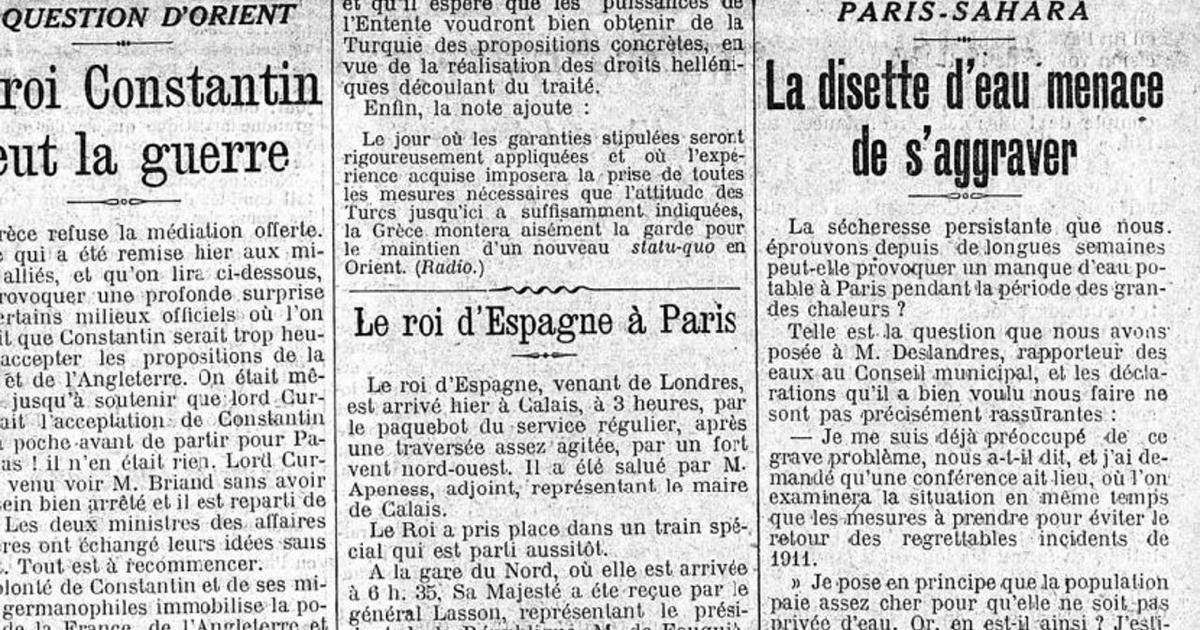In partnership with
RetroNews
, the BnF press site
It is considered the most severe meteorological drought in the last 150 years.
And if today the frequency and intensity of these episodes are accelerating, the drought of 1921 - which actually runs from the fall of 1920 to the end of the following year - is anchored in memories.
In the summer, France and the whole of Europe lament over lost harvests while in Russia around the Volga basin, a famine decimates the populations.
A dramatic winter drought
This calamity has its roots in a spectacular winter drought.
“Never, you hear, never has science observed such a succession of dry months.
Never has a series of days been recorded as regularly with little rain as the one we have known for more than 7 months”
, laments in
L'Humanité
on March 23 the director of the Meteorological Institute.
And despite the beneficial rains of April, the devastating effects of the lack of water are hard felt in the spring.
In Paris, the level of the Seine is at its lowest and there are concerns about potentially dangerous fumes for residents of the river.
The situation does not only make people unhappy.
Thus the advertisers who play on fears:
"With the drought, water becomes dangerous"
, they proclaim in inserts in favor of
"table water, ideally pure, pleasant and light"
: Evian-Cachat .
The disastrous harvests, the roasted pastures
In the countryside, the wheat crops are resisting but the spring cereals, oats and barley, are already roasted, report the press.
Weeds invade the crops, the fodder yield is ridiculous, livestock farming is threatened.
On August 11, Le
Courrier de Saône-et-Loire
reports that the potato harvest is already compromised, the beet yield is derisory, there is nothing to hope for from the buckwheats.
“In the meadows and in the pastures not the slightest trace of vegetation;
the animals can no longer live there, the grass is grilled, roasted to the root”
.
Milk production
"is reduced by a quarter"
, specifies
L'Intransigeant
.
Even oysters are victims of drought.
The inevitable consequence: food prices rise.
In July, the heat wave hits France
In the suburbs of Paris, the profession of water carrier is reborn as some wells dry up.
“Little by little the wise inhabitants mobilized the barrels and went to fetch the precious liquid from the nearest river or from the neighboring communal fountains, sometimes ten or fifteen kilometers away”, reports Le Figaro on
August
11
.
Before reselling the water at exorbitant prices to their neighbours.
If the situation is so dramatic, it is because in July the heat wave hit the country.
“The thermometer is rising, rising, reaching dizzying heights.
Everything dries up, everything cracks, everything burns and we stick out our tongues like poor doggies”
, deplores
Le Figaro
on July 14.
And it's not over: the heat peak is on July 28 and 29.
At that time, temperatures reached 38° or more over three quarters of France.
The thermometer rises to 38.4° in the shade in the capital, which has not been seen since 1881.
Russia is starving
The situation, however, was much worse elsewhere, in southwestern Russia and eastern Ukraine, where drought coupled with the disorganization of the country's agricultural production led to a terrible famine until the summer of 1922. It is almost as deadly as the great Ukrainian famine which will rage ten years later.
More than 5 million Soviets, poor peasants and many children died of hunger and typhus which spread among the population thrown on the roads.
A situation so dramatic that Lenin resolves to appeal for international aid.
The writer Maxime Gorki relays the call of the authorities in Europe while relief is organized under the aegis of the Red Cross and the American Relief Administration (ARA).
terrifying pictures,
In France, other episodes of winter drought will be particularly significant in the following years.
In 1976, the year a drought tax was created, the alert was given in May.
In 2023, the record for a day without rain in winter was broken in February, surpassing that of 1989 and 2020. For future harvests, the month of March will be crucial.

